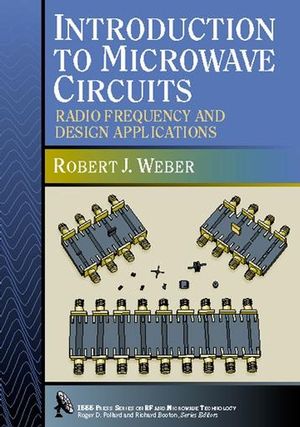Introduction to Microwave Circuits: Radio Frequency and Design ApplicationsISBN: 978-0-7803-4704-5
Hardcover
448 pages
January 2001, Wiley-IEEE Press
 This is a Print-on-Demand title. It will be printed specifically to fill your order. Please allow an additional 15-20 days delivery time. The book is not returnable.
|
||||||
"Do you want to design a wireless transmitter or receiver for hand-held telephones? Have you wondered why the printed circuit wires on high-frequency circuits don't always run in a straight line? This valuable text will answer all of your questions regarding component parasitics and circuit characterization for rf/microwave amplifier, oscillator, and filter circuit design and analysis. You will understand why capacitors act as inductors and vice versa and why amplifiers work like oscillators, while oscillators for local area networks work more like local area heaters.
Application of the information in Introduction to Microwave Circuits will reduce design-cycle time and costs, markedly increasing the probability of first-time success in printed circuit or monolithic microwave integrated circuit (MMIC) design. Several approaches are taken into consideration, such as the effects of currents on the ground plane, bypass and coupling capacitors, and nonlinear effects in linear circuits. Featured topics include:
* Incorporation of component parasitics in the design cycle
* Closed form solution to oscillator design
* Odd mode stability analysis
* PIN diode analysis for high-power switching applications
An integrated design example of a 1.25 GHz amplifier, oscillator, and filter printed circuit is also included, which could be useful in printed circuit board designs from tens of megahertz to tens of gigahertz.
Introduction to Microwave Circuits provides the tools necessary to analyze or synthesize microwave circuits. This text is an essential reference for undergraduate students, microwave engineers, and administrators. Also, it will assist experienced designers in other fields to meet the current rapid expansion of communication system applications and work effectively in microwave circuit design.
About the Author
Robert J. Weber began his prolific career in the Solid State Research Laboratory at the Collins Radio Company, later a part of Rockwell International. For 25 years, he worked on advanced development and applied research in the one- to ten-gigahertz frequency range and received several distinguished awards for his valuable contributions to the field.
Dr. Weber is involved in ongoing experimental research in integrating microwave circuits with other devices such as MEMS, chemical sensors, and electro-optics. Also, he teaches microwave circuit design and fiber-optics communications at the Department of Electrical and Computer Engineering, Iowa State University. Dr. Weber is an IEEE Fellow."
Sponsored by:
IEEE Microwave Theory and Techniques Society.
Application of the information in Introduction to Microwave Circuits will reduce design-cycle time and costs, markedly increasing the probability of first-time success in printed circuit or monolithic microwave integrated circuit (MMIC) design. Several approaches are taken into consideration, such as the effects of currents on the ground plane, bypass and coupling capacitors, and nonlinear effects in linear circuits. Featured topics include:
* Incorporation of component parasitics in the design cycle
* Closed form solution to oscillator design
* Odd mode stability analysis
* PIN diode analysis for high-power switching applications
An integrated design example of a 1.25 GHz amplifier, oscillator, and filter printed circuit is also included, which could be useful in printed circuit board designs from tens of megahertz to tens of gigahertz.
Introduction to Microwave Circuits provides the tools necessary to analyze or synthesize microwave circuits. This text is an essential reference for undergraduate students, microwave engineers, and administrators. Also, it will assist experienced designers in other fields to meet the current rapid expansion of communication system applications and work effectively in microwave circuit design.
About the Author
Robert J. Weber began his prolific career in the Solid State Research Laboratory at the Collins Radio Company, later a part of Rockwell International. For 25 years, he worked on advanced development and applied research in the one- to ten-gigahertz frequency range and received several distinguished awards for his valuable contributions to the field.
Dr. Weber is involved in ongoing experimental research in integrating microwave circuits with other devices such as MEMS, chemical sensors, and electro-optics. Also, he teaches microwave circuit design and fiber-optics communications at the Department of Electrical and Computer Engineering, Iowa State University. Dr. Weber is an IEEE Fellow."
Sponsored by:
IEEE Microwave Theory and Techniques Society.



